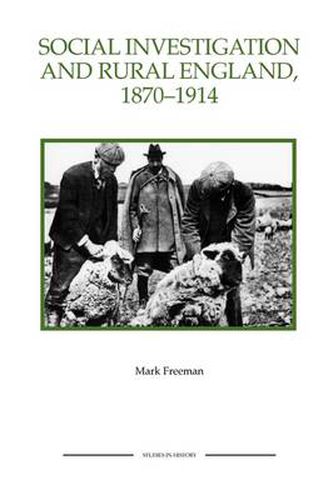Readings Newsletter
Become a Readings Member to make your shopping experience even easier.
Sign in or sign up for free!
You’re not far away from qualifying for FREE standard shipping within Australia
You’ve qualified for FREE standard shipping within Australia
The cart is loading…






This book explores the theory and practice of social investigation in rural England in the period 1870-1914. It shows the extent to which a developing ‘passion for inquiry’ drew to the English countryside a wide range of social investigators concerned with such issues as agricultural trade unionism, rural depopulation, rural poverty, the condition of rural housing and the land question. Adopting a broad definition of social investigation, incorporating reports of royal commissions and special correspondent journalists as well as the popular literary accounts of Richard Jefferies and George Sturt, the study also enhances the literature of social inquiry by examining the rural investigations of men like Charles Booth and Seebohm Rowntree, best known for their urban social surveys. At the same time Social Investigation and Rural England makes a significant contribution to the rural history of the period, by illustrating how social and political conflicts in the English countryside influenced the processes of information-gathering by social investigators, and how the rural population responded to their activities.
MARK FREEMAN is lecturer in social history, University of Glasgow.
$9.00 standard shipping within Australia
FREE standard shipping within Australia for orders over $100.00
Express & International shipping calculated at checkout
This book explores the theory and practice of social investigation in rural England in the period 1870-1914. It shows the extent to which a developing ‘passion for inquiry’ drew to the English countryside a wide range of social investigators concerned with such issues as agricultural trade unionism, rural depopulation, rural poverty, the condition of rural housing and the land question. Adopting a broad definition of social investigation, incorporating reports of royal commissions and special correspondent journalists as well as the popular literary accounts of Richard Jefferies and George Sturt, the study also enhances the literature of social inquiry by examining the rural investigations of men like Charles Booth and Seebohm Rowntree, best known for their urban social surveys. At the same time Social Investigation and Rural England makes a significant contribution to the rural history of the period, by illustrating how social and political conflicts in the English countryside influenced the processes of information-gathering by social investigators, and how the rural population responded to their activities.
MARK FREEMAN is lecturer in social history, University of Glasgow.